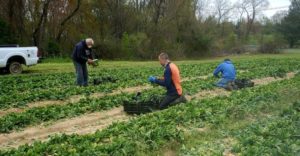Just in from the United Fresh Produce Association:
The U.S. Department of Agriculture (USDA) Agricultural Marketing Service (AMS) today released its solicitation for proposals for the “Buy Fresh” Coronavirus Farm Assistance Program (CFAP) to purchase and distribute $100 million a month of fresh fruit and vegetables for approximately six months. USDA will award contracts for the purchase of fresh fruits and vegetables, the assembly of commodity boxes, and delivery to identified food banks, food pantries, churches, schools, community groups, and other non-profit and governmental organizations that can receive and distribute food items.
- The solicitation and supporting documents can be found at bottom of the page here.
- Request for Proposals (RFP) will be due on May 1, 2020.
- AMS will hold a conference call on Tuesday, April 28th at 12:00 pm EDT (dial-in instructions forthcoming) to field additional questions from the RFP. Any questions should be submitted in the meantime to: USDAFoodBoxDistributionProgram@usda.gov
- A recording of a United Fresh/ARS information webinar conducted on April 23rd can be found here. Additional details and updates can be found on the AMS-CFAP landing page.

